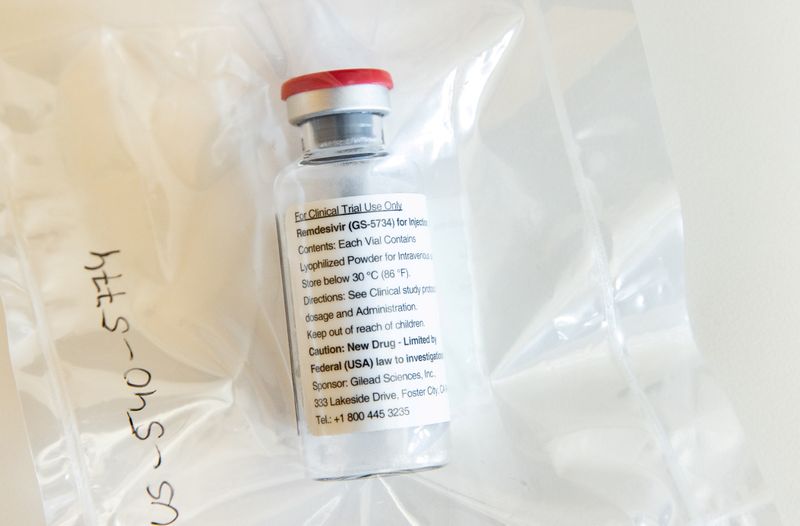By Kate Kelland
LONDON (Reuters) - Gilead's drug remdesivir is not recommended for patients hospitalised with COVID-19, regardless of how ill they are, as there is no evidence it improves survival or reduces the need for ventilation, a World Health Organization panel said on Friday.
"The ... panel found a lack of evidence that remdesivir improved outcomes that matter to patients such as reduced mortality, need for mechanical ventilation, time to clinical improvement, and others," the guideline said.
The advice is another setback for the drug, which grabbed worldwide attention as a potentially effective treatment for COVID-19 in the summer after early trials showed some promise.
At the end of October, Gilead (O:GILD) cut its 2020 revenue forecast, citing lower-than-expected demand and difficulty in predicting sales of remdesivir.
The antiviral is one of only two medicines currently authorised to treat COVID-19 patients across the world, but a large WHO-led trial known as the Solidarity Trial showed last month that it had little or no effect on 28-day mortality or length of hospital stays for COVID-19 patients.
The medication was one of the drugs used to treat U.S. President Donald Trump's coronavirus infection, and had been shown in previous studies to have cut time to recovery. It is authorised or approved for use as a COVID-19 treatment in more than 50 countries.
Gilead has questioned the Solidarity Trial's results.
"Veklury is recognised as a standard of care for the treatment of hospitalised patients with COVID-19 in guidelines from numerous credible national organisations," Gilead said in a statement, referring to the drug's brand name.
"We are disappointed the WHO guidelines appear to ignore this evidence at a time when cases are dramatically increasing around the world and doctors are relying on Veklury as the first and only approved antiviral treatment for patients with COVID-19."
The WHO's Guideline Development Group (GDG) panel said its recommendation was based on an evidence review that included data from four international randomised trials involving more than 7,000 patients hospitalised with COVID-19.
After reviewing the evidence, the panel said, it concluded that remdesivir, which has to be given intravenously and is therefore costly and complex to administer, has no meaningful effect on death rates or other important outcomes for patients.
"Especially given the costs and resource implications associated with remdesivir ...the panel felt the responsibility should be on demonstrating evidence of efficacy, which is not established by the currently available data," it added.
The latest WHO advice comes after one of the world's top bodies representing intensive care doctors said the antiviral should not be used for COVID-19 patients in critical care wards.
The WHO's recommendation, which is not binding, is part of its so-called "living guidelines" project, designed to offer guidance for doctors to help them make clinical decisions about patients in fast-moving situations such as the COVID-19 pandemic. The guidelines can be updated and reviewed as new evidence and information emerges.
The panel said, however, that it supported continued enrolment into clinical trials evaluating remdesivir in patients with COVID-19, which it said should "provide higher certainty of evidence for specific groups of patients".

The recommendation may raise further questions about whether the European Union will need the 500,000 courses of the antiviral worth 1 billion euros it ordered last month.